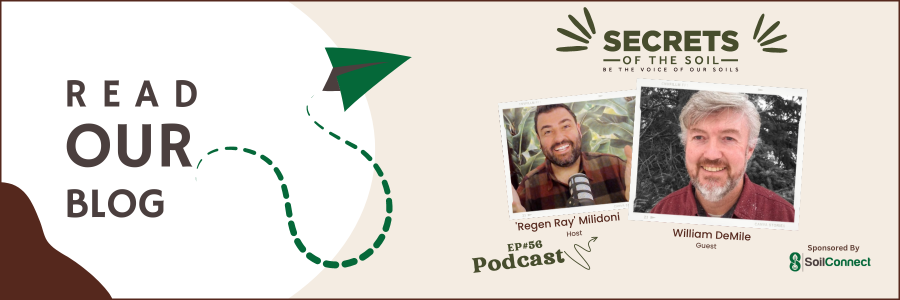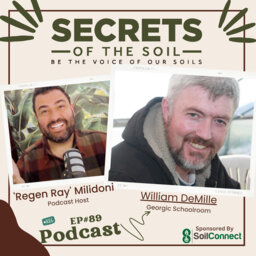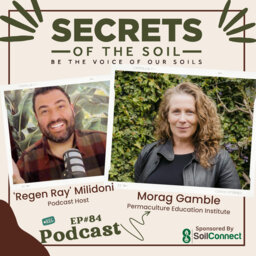Join us for an enlightening conversation with regenerative farming expert William DeMille on the latest episode of “Secrets of the Soil.” William shares insights from his journey transitioning from traditional to regenerative agriculture on his Nevada farm, fostering soil health, and nurturing the next generation of eco-conscious farmers.
Episode Highlights:
– Reviving Soil Health: Discover the transformative power of regenerative agriculture techniques in enhancing soil fertility and biodiversity.
– Mindset and Education: Dive into the gaps in our educational systems concerning personal development and mindfulness, particularly in agriculture.
-Sustainability and Community: Learn about the ecological processes crucial for sustainability and how stronger community-farmer connections can enrich our food systems.
Key Takeaways:
– Feed the Soil, Feed the Soul: Emphasizing the importance of soil health for producing nutrient-rich foods, and how it directly impacts human health and environmental sustainability.
– Re-thinking Education: The need for a shift in how we educate future generations on agriculture, focusing on holistic approaches that include personal development and entrepreneurial skills.
– Building Connections: The significance of enhancing consumer-farmer relationships to ensure a dependable, healthy food supply and more informed food choices.
Tune in to gain profound insights into how changing our farming practices can lead to a healthier society and planet. Understand why nurturing the soil and the soul are inseparable elements of regenerative agriculture.
Let’s regenerate, educate, and connect for a sustainable future! 🌾🌟
Who is William DeMille
William DeMille is a farmer. He studied Horticulture and Agronomy at Northwest Missouri University. He holds two certificates in aquaponic engineering and production from Cornell University, NY, and from GrowHaus Aquaponics, CO, and also graduated from Dr. Elaine’s Soil Food Web School and Healing Mountain Massage School. William is the Director of Georgic Development for Monticello College, Ut. William is a farm consultant and runs a school in northern Nevada teaching the principles of Permaculture, Biodynamics, Silvopasture, Holistic Management, and Georgics. William owns and operates a soil testing laboratory. William is married with 4 children living in The Humboldt Mountains of northern Nevada.

In our latest podcast episode on “Secrets of the Soil”, regenerative farmer William DeMille shared valuable insights into the practices that are not only revitalizing his farmlands but could also transform global agriculture. By employing methods such as crop rotations, using organic compost, and integrating livestock into crop areas, DeMille emphasizes the symbiotic relationship between the soil and plant life. This approach, he points out, enhances the soil’s nutrient profile and overall structure, which in turn increases productivity and resilience to diseases.
Covering the Soil: A Protective Blanket
According to DeMille, a crucial element in regenerative agriculture is keeping the soil covered with live plants at all times. This practice helps maintain moisture, curbs erosion, and encourages a thriving ecosystem below the surface, which is essential to prevent desertification. The ongoing cycle of decay and renewal is what feeds the soil effectively, making chemical fertilizers redundant in the process.
Mindfulness in Farming and Life
Beyond the technicalities of farming, DeMille delved into the philosophical aspect of agricultural practice. Echoing Gandhi, he encourages us to embody the change we wish to see in the world. By adopting mindfulness and being proactive in our choices, whether in the fields or in urban settings, we can significantly influence both our immediate environments and the wider community. This practice of mindfulness fosters a deep connection with the tasks at hand and mirrors the meticulous care regenerative farming requires.
Ecological Processes: The Four Pillars of Agriculture
DeMille’s farming philosophy is greatly influenced by understanding the four basic ecological processes: the water cycle, mineral cycle, ecological succession, and energy flow. These processes are essential for fostering a robust ecosystem that supports healthy crops and, consequentially, healthy humans. This knowledge is critical, yet often overlooked, which underscores the importance of bringing this awareness into educational curriculums, especially those focused on culinary arts.
Challenges and Solutions for Modern Farmers
The discussion also highlighted the practical challenges many young farmers face today, such as land acquisition and the need for comprehensive skills beyond traditional farming practices. DeMille suggests that integrating business acumen, marketing, and community-building initiatives into agricultural education can empower future farmers to thrive in the modern age. Tools like Community Supported Agriculture (CSA), social media for direct marketing, and even farm-based tourism can create viable economic models while fostering closer producer-consumer relationships.
Building a Legacy of Taste and Sustainability
One poignant point DeMille raised was the modern disconnect people have with real food flavors—often opting for artificially enhanced products due to undeveloped palates that shy away from the rich, sometimes intense profiles of naturally grown fruits and vegetables. Educating consumers about the origins of their food and the effort that goes into sustainable farming can gradually shift public perception and demand towards more natural, wholesome products. This shift is crucial for public health and the viability of future farming.
As the conversation wrapped up, DeMille’s passion was palpable as he expressed his commitment to becoming the voice of the soil—calling others to learn, reflect, and engage in transforming our farming landscapes and consumption habits. For those interested in exploring more about William DeMille’s approach or regenerative agriculture in general, visiting his website and exploring resources, such as his book “Worry-Free Eating”, can offer both practical knowledge and philosophical guidance.
As we continue to explore these integral topics on “Secrets of the Soil”, we invite our listeners to reflect on how even small, mindful decisions can lead to substantial and positive changes in our personal health, our communities, and the environment.






